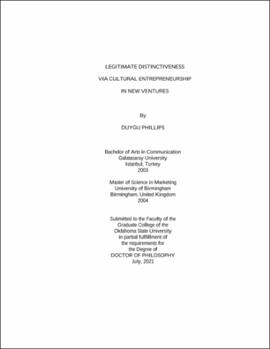| dc.contributor.advisor | Rutherford, Matthew W. | |
| dc.contributor.author | Phillips, Duygu | |
| dc.date.accessioned | 2022-01-09T19:44:14Z | |
| dc.date.available | 2022-01-09T19:44:14Z | |
| dc.date.issued | 2021-07 | |
| dc.identifier.uri | https://hdl.handle.net/11244/333654 | |
| dc.description.abstract | "To be different or to be the same?" Taking an ambidextrous perspective, I argue that new ventures can acquire legitimacy through their identity claims that communicate both distinctiveness and conformity. Adopting a cultural entrepreneurship process model, I submit that both competitive distinctiveness and institutional conformity can individually serve as legitimating strategies in identity development by forming propriety judgements and that legitimacy mediates the relationship between distinctiveness, conformity and performance. Moreover, I suggest that these relationships will be contingent upon validity judgments of category appeal. | |
| dc.description.abstract | I develop theory around, and test, the relationship between competitive distinctiveness and pragmatic legitimacy and challenge the longstanding path-dependent assertion that prioritizes conformity. I argue that (1) competitive distinctiveness, by itself, can lead to legitimacy; (2) identity claims with high distinctiveness and low conformity can generate positive outcomes: and (3) the strength of competitive distinctiveness-performance and institutional conformity-performance relationships are contingent upon the level of category appeal. To test the hypotheses, I conduct two separate studies: (1) an experimental design, and (2) quantitative study of a social media (i.e., Twitter) dataset. | |
| dc.description.abstract | There are five main contributions of this dissertation. First, this study adds precision to the construct of legitimate distinctiveness by finding support for both distinctiveness and conformity can be associated with positive outcomes. It also enhances precision in the cultural entrepreneurship process by modeling and testing pragmatic legitimacy and normative legitimacy as mediators. Second, I answer the call from researchers to examine the effects of institutional and competitive isomorphism simultaneously by testing the effects of competitive distinctiveness and institutional conformity. Third, this study advances research by theorizing and testing the moderating effect of distinctiveness on conformity-performance relationship. Fourth, the findings advance the categorization literature by providing evidence for the moderating role of category appeal on distinctiveness-performance as well as conformity-performance relationship. Fifth, by conducting two separate studies involving two robust designs utilizing datasets sampling two major stakeholder groups, and measuring individual perceptions (i.e., propriety judgements) as well as collective (i.e., validity judgements), I answer the call by researchers to integrate micro and macro perspectives of legitimacy. | |
| dc.format | application/pdf | |
| dc.language | en_US | |
| dc.rights | Copyright is held by the author who has granted the Oklahoma State University Library the non-exclusive right to share this material in its institutional repository. Contact Digital Library Services at lib-dls@okstate.edu or 405-744-9161 for the permission policy on the use, reproduction or distribution of this material. | |
| dc.title | Legitimate distinctiveness via cultural entrepreneurship in new ventures | |
| dc.contributor.committeeMember | Moore, Curt | |
| dc.contributor.committeeMember | Madison, Kristen | |
| dc.contributor.committeeMember | Edwards, Bryan D. | |
| osu.filename | Phillips_okstate_0664D_17246.pdf | |
| osu.accesstype | Open Access | |
| dc.type.genre | Dissertation | |
| dc.type.material | Text | |
| dc.subject.keywords | cultural entrepreneurship | |
| dc.subject.keywords | identity claims | |
| dc.subject.keywords | legitimacy | |
| dc.subject.keywords | legitimate distinctiveness | |
| dc.subject.keywords | new ventures | |
| thesis.degree.discipline | Business Administration | |
| thesis.degree.grantor | Oklahoma State University | |
